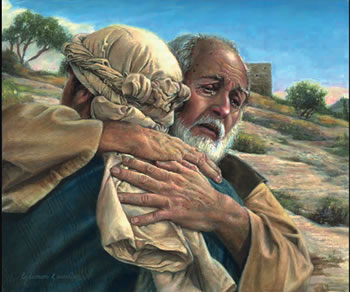People of hope
 We, Christians, are women and men of hope.
We, Christians, are women and men of hope.
Hope emerges clearly from the first New Testament text that was written, the First Letter of Saint Paul to the Thessalonians. In 1 Thessalonians 5:4-11 we find all the freshness and beauty of the first Christian proclamation. The Thessalonian community is a young community, recently founded, yet despite difficulties and many trials, it is rooted in the faith, and celebrates the Resurrection of the Lord Jesus enthusiastically and joyfully.
Daughters of light and sons of day
Thus, Paul heartily rejoices with all, in as much as those that are reborn at Easter truly become ‘daughters of light and sons of the day’ (5:5), in virtue of their full communion with Christ.
When Paul writes to them, the community of Thessalonika had just been founded, and only a few years separate it from Christ’s Death and Resurrection. Therefore, the Apostle tries to make them understand all the effects and consequences that this unique and decisive event, the Lord’s Resurrection, implies for history and for the life of each one.
The resurrection of the dead
In particular, the difficulty for the community was not so much to acknowledge Jesus’ Resurrection, as all believed in it, but to believe in the resurrection of the dead. Yes, Jesus is risen, but the difficulty was to believe that the dead will rise again. In this connection, this Letter is revealed as all the more timely. Every time we find ourselves in face of our death, or that of a loved one, we feel our faith is put to the test. All our doubts arise, all our frailty, and we wonder: ‘But will there truly be life after death …? Will I be able to see again and embrace again the persons I loved …?’ We all are somewhat afraid of this uncertainty of death.
In face of the fears and perplexities of the Thessalonian community, Paul invites them and us to wear the hope of salvation like a helmet (1 Thess 5:8), especially in the trials and in the most difficult moments of life, in the knowledge that, because Christ is risen, the object of our hope is certain.
When there is talk of hope, we can be led to understand it according to the ordinary meaning of the term, namely, in reference to something good that we desire, but which can or cannot be realised. We hope it will happen; it is like a desire. One says, for example, ‘I hope the weather will be good tomorrow’; but we know that, instead, the weather could be bad the next day … Christian hope is not like this.

Prodigal Son
The expectation of something accomplished
Christian hope is the expectation of something that has already been accomplished, and which certainly can be realised for each one of us. Therefore, our resurrection also, and that of our dear deceased, is not something that might or might not happen, but it is a certain reality, in as much as it is rooted in the event of Christ’s Resurrection. To hope, therefore, means to learn to live in expectation -- to learn to live in expectation and to find life. When a woman realises she is pregnant, she learns to live every day in the expectation of seeing the gaze of the child that will come. So, we must also live and learn from these human expectations and live in the expectation of seeing the Lord, of encountering the Lord. This is not easy, but it can be learned: to live in expectation. To hope means and implies a humble heart, a poor heart. Only a poor one knows how to wait. One who is already full of himself and of his possessions does not put his trust in anything other than himself.
The total certainty of hope
Again, Saint Paul writes, ‘Jesus died for us so that whether we wake or sleep we might live with him’ (1 Thessalonians 5:10). These words are always a motive of great consolation and peace. Therefore, we are also called to pray for loved ones who have left us, so that they will live in Christ and be in full communion with us. Something that touches my heart very much is an expression of Saint Paul, again addressed to the Thessalonians. It fills me with the certainty of hope. He writes, ‘and so we shall always be with the Lord’ (1 Thess 4:17). Something beautiful: everything passes but, after death, we will always be with the Lord. It is the total certainty of hope. Do you believe this? I invite you to say it three times with me: ‘And so we shall always be with the Lord.’
Source: Zenit 1 February 2017 (edited)
 Entries(RSS)
Entries(RSS)